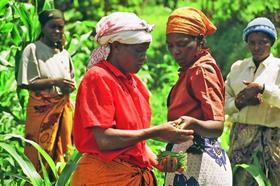
New biopesticide company Real IPM UK is bringing expertise from its Kenyan operations to Britain with the aim of registering its range of biopesticides in the EU.
Following a trip to Kenya, cereals grower Antony Pearce says he was “completely blown away” by growers’ successful use of biopesticides on broad-acre crops, as he had previously thought this was only possible in protected environments.
Real IPM’s range of products are well-established in South Africa, Kenya and Tanzania, and following a successful EU registration, Pearce expects them to be available in the Netherlands in 2019 and in the rest of Europe the year after.
The new business will enable production, registration and distribution of biological controls that have already made huge reductions in the use of chemical pesticides in Africa, through collaboration with parent company Real IPM Kenya. Along with Pearce, former director of supplier-owned biopesticide firm Dudutech Louise Labuschagne, is also on board as a director.
Real IPM’s range of products tackles pests including weevils, whiteflies, mealy bugs and varroa mites, and Pearce believes the most exciting thing is the range of three metarhizium insecticides that tackle thrips, aphid and spider mites.
“We aim for them to be used little and often so you can maintain base populations,” says Pearce. “You can’t be pricing biopesticides as a boutique product, as one of the biggest barriers to usage is price. Ours will cost more than chemical applications, but less than other biopesticides. In Kenya, they are priced at €20 per spray hectare; a chemical application would be about €5 or €6, but a conventional biopesticide would be in the hundreds.”
Production of products will continue to be in Kenya, which is how the company is able to make cost-savings on selling price.
As well as a suite of products, Real IPM UK’s business structure is also unique in that it requires any investors to be farmers, trusts or foundations with environmentally-sensitive farming principles. In this way, the company hopes to avoid collaboration with major agrochemical companies or venture capitalists and preserve its environmental principles.



